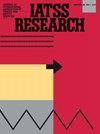Collection duration of driving tracking data of older drivers
IF 3.3
Q3 TRANSPORTATION
引用次数: 0
Abstract
Driving tracking, or the observation of actual and naturalistic driving, is an effective approach for understanding and assessing the driving behaviors of older drivers. However, limited information is available regarding the effects of data collection duration on the characteristics of driving behavior. This study examined how different data collection durations (2 weeks and 1, 3, 6, and 12 months) influence older drivers' long-term driving behavior, specifically rapid deceleration events (RDEs). Analysis of the varying durations revealed common tendencies related to low-mileage bias (LMB) as well as differences in the likelihood of RDE occurrence. These factors were incorporated into predictive models, with values estimated using negative binomial regression across the different data collection durations. The results indicated that the characteristics of driving behavior differ between short-term (2 weeks and 1 month) and long-term (3, 6, and 12 months) data collection. Finally, this study provides insights into establishing a methodology for tracking driving behavior in older adults.
老司机行车跟踪数据采集时长
驾驶跟踪,或观察实际和自然驾驶,是理解和评估老年驾驶员驾驶行为的有效方法。然而,关于数据收集时间对驾驶行为特征的影响的信息有限。本研究考察了不同的数据收集时间(2周、1、3、6和12个月)如何影响老年驾驶员的长期驾驶行为,特别是快速减速事件(RDEs)。对不同持续时间的分析揭示了与低里程偏差(LMB)相关的共同趋势以及RDE发生可能性的差异。这些因素被纳入预测模型,在不同的数据收集持续时间内使用负二项回归估计值。结果表明,短期(2周和1个月)和长期(3、6和12个月)数据收集的驾驶行为特征存在差异。最后,本研究为建立跟踪老年人驾驶行为的方法提供了见解。
本文章由计算机程序翻译,如有差异,请以英文原文为准。
求助全文
约1分钟内获得全文
求助全文
来源期刊

IATSS Research
TRANSPORTATION-
CiteScore
6.40
自引率
6.20%
发文量
44
审稿时长
42 weeks
期刊介绍:
First published in 1977 as an international journal sponsored by the International Association of Traffic and Safety Sciences, IATSS Research has contributed to the dissemination of interdisciplinary wisdom on ideal mobility, particularly in Asia. IATSS Research is an international refereed journal providing a platform for the exchange of scientific findings on transportation and safety across a wide range of academic fields, with particular emphasis on the links between scientific findings and practice in society and cultural contexts. IATSS Research welcomes submission of original research articles and reviews that satisfy the following conditions: 1.Relevant to transportation and safety, and the multiple impacts of transportation systems on security, human health, and the environment. 2.Contains important policy and practical implications based on scientific evidence in the applicable academic field. In addition to welcoming general submissions, IATSS Research occasionally plans and publishes special feature sections and special issues composed of invited articles addressing specific topics.
 求助内容:
求助内容: 应助结果提醒方式:
应助结果提醒方式:


